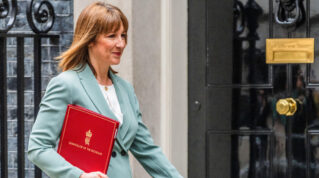The next government should “rebalance” funding back towards schools with the poorest intakes, extend and increase pupil premium funding and reinstate cash for tutoring, a social mobility charity has said.
The Sutton Trust has published a report which also calls for the extension of free school meals to all families claiming universal credit, and for schools to be forced to prioritise poorer children in admissions.
Polling for the charity by More in Common found 83 per cent of the public thought there was a big class gap in Britain today, with 63 per cent saying it was either bigger or the same as 50 years ago.
Sixty-two per cent said children from richer families “enjoy better opportunities in schools”, and half of 18 to 24-year-olds said it was harder to move from working class to middle class today”.
Fifty-seven per cent of young people said it was harder for them to succeed today than for older generations.

Respondents believed the main barriers to succeeding in life were a lack of opportunities where people live (30 per cent), lack of access to good education (29 per cent), a poor work ethic (29 per cent), the state of the UK economy (28 per cent) and lack of self-belief (26 per cent).
Sutton Trust founder Sir Peter Lampl warned that “for too long, successive governments have failed to increase opportunities for low- and moderate-income young people”.
“As a result, there is a yawning gap in attainment between the well-off and their less affluent peers, which is the main reason we have low and declining social mobility in this country.
“The public clearly wants this to change and the next government needs to get on board and make it happen.”
1. ‘Rebalance’ funding back to poorer schools
In recent years, successive governments have attempted to address historic underfunding of some better-off areas of England through its national funding formula.
The Sutton Trust said the next government should reform the formula to “rebalance funding back towards schools serving the most disadvantaged communities, with a specific element reflecting persistent disadvantage”.
2. Reverse real-terms cuts to the pupil premium
Pupil premium funding, handed to schools for any pupils eligible for free school meals at any point in the previous six years, has not kept pace with inflation.
Real-terms cuts to pupil premium funding should be reversed, restoring funding to 2014-15 levels by the end of the next Parliament, the report said. This would cost £140 million in the first year and benefit 2.1 million schoolchildren.
The pupil premium should also be extended to post-16 institutions because “the attainment gap doesn’t end at 16, and neither should dedicated funding”.
A grant of around £750 per pupil would cost £230m, benefitting around 260,000 students. The scheme could also initially be piloted in a group of council areas.
3. Require schools to prioritise poorer pupils
Ministers should also reduce “social segregation” in schools by making admissions policies fairer, “including requiring schools to prioritise pupil premium applicants in their oversubscription criteria”.
And burdens on schools should be relieved by investing in wider support services such as mental health.
4. Reinstate tutoring programme subsidy
Funding for the National Tutoring Programme should be reinstated, with “ringfenced funding for the long term”, targeted at disadvantaged pupils.
A 75 per cent subsidy would provide courses of tutoring for 220,000 pupils per year and cost £66m.
Alternatively, the government could accompany an expanded pupil premium “with more robust guidance for schools on how it is spent”.
5. Extend FSM to all universal credit families
Currently, means-tested free school meals are given to pupils whose families claim universal credit, but only if their income is below £7,300 a year.
Free school meals should be extended to all children from households claiming universal credit, the report said. It also recommended increasing breakfast club provision.
Extending FSM eligibility “could bring around 1 million new children into eligibility” and cost between £360m and £540m.
6. Invest in CPD and increase levelling-up premium
To tackle the teacher recruitment and retention crisis, the government should increase investment in continuing professional development.
They should also incentivise the best teachers to work in the most disadvantaged schools “by making changes across the system, including enhancing financial incentives and increasing flexibility”.
The levelling-up premium for early career teachers in disadvantaged areas currently pays between £3,000 and £6,000 to teachers of chemistry, computing, maths and physics.
The report said it should be extended to more subjects, guaranteed for five years and increased by between £2,500 and £3,000, at a cost of £46 million. This would impact 9,000 teachers a year.
















Your thoughts